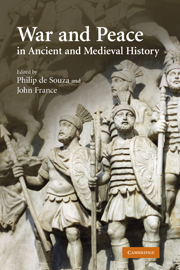Book contents
- Frontmatter
- Contents
- List of contributors
- Acknowledgements
- Note on abbreviations
- 1 Introduction
- 2 Making and breaking treaties in the Greek world
- 3 War, peace and diplomacy in Graeco-Persian relations from the sixth to the fourth century bc
- 4 Treaties, allies and the Roman conquest of Italy
- 5 Parta victoriis pax: Roman emperors as peacemakers
- 6 Treaty-making in Late Antiquity
- 7 Byzantine diplomacy: good faith, trust and co-operation in international relations in Late Antiquity
- 8 Treaties between Byzantium and the Islamic world
- 9 Siege conventions in Western Europe and the Latin East
- 10 Paying the Danegeld: Anglo-Saxon peacemaking with vikings
- 11 Peace among equals: war and treaties in twelfth-century Europe
- Bibliography
- Index
8 - Treaties between Byzantium and the Islamic world
Published online by Cambridge University Press: 09 August 2009
- Frontmatter
- Contents
- List of contributors
- Acknowledgements
- Note on abbreviations
- 1 Introduction
- 2 Making and breaking treaties in the Greek world
- 3 War, peace and diplomacy in Graeco-Persian relations from the sixth to the fourth century bc
- 4 Treaties, allies and the Roman conquest of Italy
- 5 Parta victoriis pax: Roman emperors as peacemakers
- 6 Treaty-making in Late Antiquity
- 7 Byzantine diplomacy: good faith, trust and co-operation in international relations in Late Antiquity
- 8 Treaties between Byzantium and the Islamic world
- 9 Siege conventions in Western Europe and the Latin East
- 10 Paying the Danegeld: Anglo-Saxon peacemaking with vikings
- 11 Peace among equals: war and treaties in twelfth-century Europe
- Bibliography
- Index
Summary
In 958 a Byzantine fleet suffered a serious defeat in the waters off Sicily. Shortly afterwards the Byzantine emperor Constantine VII Porphyrogenitus sent an envoy to Kairouan in modern-day Tunisia to negotiate a truce with the victors in that naval battle, a Muslim Shi'a dynasty called the Fatimids. The envoy arrived with a suppliant attitude, a humble letter and a desperate plea for a peace treaty. The caliph al Mu'izz greeted the Byzantine embassy with a perfect articulation of standard Islamic attitudes to peace with the non-Islamic world:
Religion and Islamic law prevent the grant of a perpetual treaty because Allah has sent his envoy the Prophet Mohammed … to invite the world to adopt his religion and to make holy war on those who oppose until they embrace Islam, unless they pay the jizya … thus putting themselves under the authority and protection of the Muslims. Peace [otherwise] is only permitted for a fixed time … in the interests of Muslims and religion.
The envoy then asked al Mu'izz to prolong the temporary peace which had hitherto existed between Byzantium and the Fatimids. Despite the fact that it was actually the Byzantines who had broken the original truce, al Mu'izz agreed.
- Type
- Chapter
- Information
- War and Peace in Ancient and Medieval History , pp. 141 - 157Publisher: Cambridge University PressPrint publication year: 2008
- 1
- Cited by



